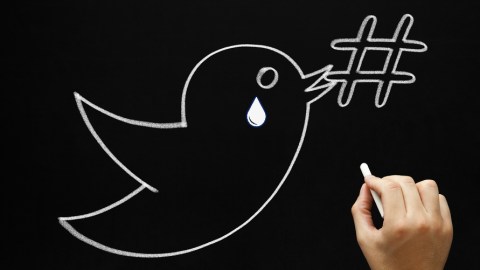Twitter As We Know It Is Over

Twitter is awesome for many reasons, but foremost because it’s a simple idea done well.
It’s built on values like conversation, choice, and brevity. It’s democratic in all the good ways and it’s the best source of breaking news currently on the Internet. A lot of smart and funny people have mastered the form and regularly create many moments of happiness for their followers. Overall, the site is a powerhouse combination of news and entertainment.
And for all those reasons, Twitter is in big trouble.
Take a look at this piece by Slate‘s David Auerbach that covers the fallout from Twitter’s disastrous Tuesday on Wall Street. Auerbach is much smarter than I am on the topic of tech stocks so I’d recommend sifting through his excellent article for intricate details, but the basic gist is that there are two sides to the coin when considering Twitter’s fantastic user experience. While all those things I mentioned above make for great browsing, they’re kryptonite to those who want Twitter to make Scrooge McDuckian piles of money. Tuesday was another low point in that pursuit; the company’s stock nosedived after first quarter revenue turned out to be $20 million less than expected.
Auerbach doesn’t think Twitter is sustainable and he doesn’t sugarcoat his assessment of its current situation:
“Twitter is acquiring users more slowly, particularly on mobile. It is failing to monetize these users as well as expected. And it is tapping other companies like Google, with whom it will partner to take advantage of its DoubleClick ad-serving platform, for lifelines. As a consequence, the ultimate value of the social network’s nearly 300 million users is looking significantly lower than previously thought. Twitter is well aware of these factors. Its recent actions signal that it is trying to redefine its business, not as a service that monetizes its users, but as a crowdsourced media platform and advertising agency — a dangerous bet that is unlikely to pay off. … Twitter is making an exceptionally dangerous bet, situating it not as the next YouTube, but somewhere between BuzzFeed and Reddit — but lacking the depth of content of either.“
As mentioned, the problem is that Twitter’s strengths double as its greatest weaknesses. People like it because it’s a public, unfiltered, no-algorithm feed of information. Unlike Facebook, Twitter isn’t able to effectively monetize its users because it doesn’t collect a ton of data based on what you like, and installing a Facebook-like system to prioritize paid tweets could scuttle the whole enterprise. Twitter doesn’t offer its users much aside from a channel for communication. Mess with that channel and users will probably take their conversations elsewhere. It’s only a matter of time until a newer and better service threatens Twitter’s very existence.
This is a classic “between a rock and a hard place” scenario. If Twitter keeps things the way they are, revenues will continue to flatten and stockholders will flee. If they tinker with their product too much, users will flee and revenues will suffer. The company is forced to aim for a sweet spot in the middle, says Auerbach, though he doubts it can pull it off.
And that’s a shame because Twitter, in its current incarnation, is important and amusing and a ton of fun. Unfortunately, those things don’t automatically translate into dollar signs, which means the Twitter we know and love isn’t long for this world.
In recognition of what we soon may be losing, Auerbach offers a very Shakespearean epitaph:
“Whatever happens, the future of Twitter is being something other than what it is right now. The company isn’t dead but walking wounded, like the Earl of Gloucester, blind and lost, heading for the Dover cliffs.”
Read more at Slate.
Below, author Charlene Li analyzes the tweeting habits of the Pope Francis and explains how a format like Twitter can be used to win over the public.





